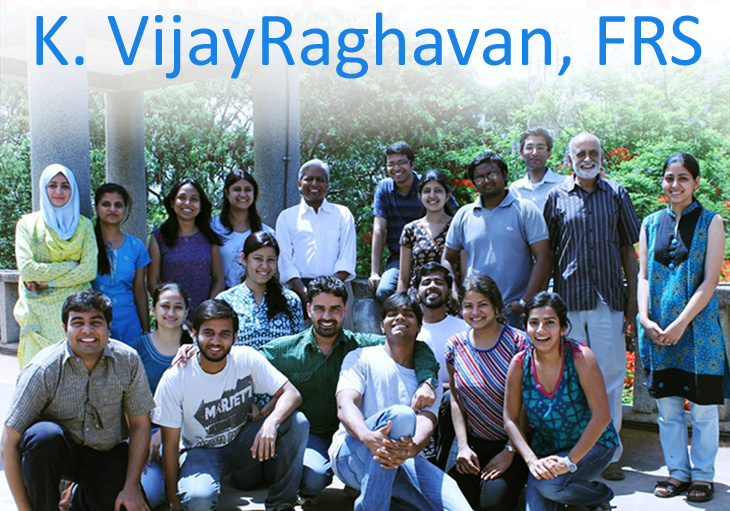K. VijayRaghavan elected Fellow of the Royal Society
The Royal Society elected NCBS director K. VijayRaghavan a Fellow of the Society on 19th April 2012. Out of six scientists of Indian origin elected as Fellows this year, VijayRaghavan is the only one based in India.
"Growing under his inclusive leadership, the National Centre for Biological Sciences is recognised internationally as a world-class institution," says the Royal Society's website of VijayRaghavan. "He has worked to establish new institutions, drawing the best young scientists to India," it adds. VijayRaghavan is also founder and director of inStem (Institute for Stem Cell Biology and Regenerative Medicine) and co-founder of C-CAMP (Centre for Cellular and Molecular Platforms), new institutes that have been set up as part of the Bangalore Bio-cluster.
The Society also applauded VijayRaghavan on his scientific contributions. "An outstanding developmental geneticist, his contributions to understanding the cellular and molecular principles of adult muscle development in Drosophila are widely recognized," it says. Talking to The Hindu, VijayRaghavan said the title was an important and valuable recognition. "Our contribution to the understanding of how nerves and muscles are built has been recognised and this has been an extraordinary scientific voyage whose success has only been due to the efforts of many students, postdoctoral fellows, junior fellows and collaborators," he added. (You can access the article in The Hindu here.)
VijayRaghavan's peers have a lot to say about him. “About 34 years ago on my first visit to TIFR, I happened to walk into a seminar being given by Vijay. He seemed to be one of the smartest students I had encountered,” says P. Balaram, director of the Indian Institute of Science, Bangalore. “Over the years Vijay has transformed the gleam in Obaid Siddiqi's eye into NCBS, which has set new standards for biological research in India. Along the way he has come to be a recognised leader in his field of developmental biology. Vijay's honours sit lightly on him and I am sure there are more to come before long.”
Mustansir Barma, director of the Tata Institute of Fundamental Research (TIFR), Mumbai, feels that it is a proud moment for TIFR to have this “signal honour” bestowed on one of its faculty. “Vijay's contributions - both his science, and institution-building - are widely recognized, and have been cited for the Fellowship as well. Within the TIFR system, Vijay remains one of our most exciting - and excitable! - characters, ever ready to take on new challenges, and more than ready to do battle with comatose complacency, bungling bureacracy and stultifying systems,” he adds.
VijayRaghavan's colleague at NCBS and dean of the institute Satyajit Mayor feels VijayRaghavan is simply getting his just due as a scientist and scientific leader. "His contribution towards building science institutes and ensuring their success (as evinced by what we have here at NCBS) lies in his tireless effort at generating an atmosphere of good spirit, camaraderie and a sense of making the impossible seem possible (and sometimes even facilitating this)," says Mayor. "This has of course had a huge impact on the kind of questions both my colleagues and myself have been able to address at NCBS. His own science has also flourished both as an independent investigator and as a prime mover in many exciting collaborations that he has instigated. Vijay's new efforts to develop a collaborative model of doing research under the umbrella of the nascent Stem Cell Research institute (inStem), is a strong testament to his ability to translate his ideas (about collaborative science) into a larger scale. The fruits of this approach will undoubtedly be seen soon enough, and I wish him all the success and recognition that he justly deserves."
C. N. R. Rao, also a Fellow of the Royal Society and Honorary President of the Jawaharlal Nehru Centre for Advanced Scientific Research, Bangalore, says he has known VijayRaghavan ever since his days as a teenager at IIT Kanpur. "I am delighted that the chemical engineer - life scientist transformation has been so successful," he says.
The Royal Society was founded in 1660, to "recognise, promote, and support excellence in science and to encourage the development and use of science for the benefit of humanity". Fellows are elected for life, and can use the title 'Fellow of the Royal Society' or FRS. Some of the most famous Fellows of the Royal Society include Isaac Newton, Charles Darwin, Bertrand Russell, Srinivasa Ramanujan and Francis Crick. Every year, forty-four new Fellows are elected from a list of proposed candidates from the United Kingdom and the Commonwealth, shortlisted by the existing Fellows of the Society. Apart from Fellows, the Society also elects Royal Fellows, Honorary Fellows and Foreign Members.
You can access the Royal Society's website for more details here.
Other links to stories covered by national publishing houses:
The Indian Express: "UK honour for top Indian-origin scientists"

Comments
Post new comment